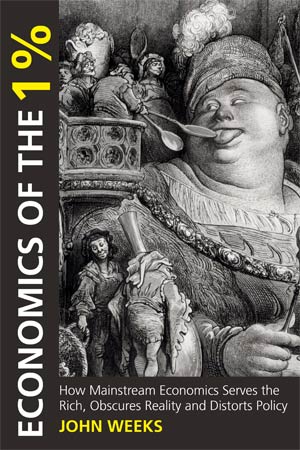
Economics has been hijacked by ‘econfakers’ and it is up to the true economists to rescue it, argues Orlando Hill

John F Weeks, Economics of the 1% (Anthem Press 2014), xi, 227pp.
Imagine a world where medicine has taken over by homeopathy; chemistry by alchemists; astronomy by astrologists, and genetics by creationists – science in the hands of pseudo-science. According to John Weeks, Professor Emeritus of Economics at SOAS, that is exactly what has happened to economics. He calls these alchemists of the social science ‘econfakers’. To call them economists would be an insult to ‘the largely unheard and unrecognised heterodox progressives who struggle on in a profession that denies their existence’ (p.xiv).
This is a book every economics student from GCSE to university should read. In it John Weeks deconstructs everything that is taught in schools, colleges and universities and regurgitated by the media (including ‘prestigious’ magazines such as The Economist) and political parties. At the end of each chapter there is a list of suggestions for further reading.
As any GCSE or A level student can repeat as a mantra, ‘economics is the study of the allocation of scarce resources to satisfy our unlimited needs and wants’. This is the so-called economic problem. The problem with humans is that the more we have, the more we want. Our needs and wants are forever changing. Nature cannot provide all the things people want. However, if we allocate our expenditures rationally, and balance work and leisure we can achieve an optimum outcome. This is the foundation of the neoclassic theory of supply and demand.
The problem is that it is all wrong. ‘Resources are not scarce, expect for what Marx named “the produce of the earth”’ (p.63). It is interesting that this latter point is one of the few things that the econfakers refuse to acknowledge. However, the most important resource in any society is labour. Every product requires labour to be produced. If labour were scarce there would be a scarcity of goods and services. The most important resource a society has is abundant. Even in times of full employment there is an acceptable rate of unemployment.
And our wants are not unlimited. If they were, businesses would not spend so much time and money on advertisements and marketing convincing us to buy even more stuff. People definitely want to improve their lives, but that is not the same as an unlimited desire for things. Humans are much better than how the econfakers like to portray us.
The dreadful supply and demand diagrams that students have to learn are another piece of fantasy that does not explain how markets work in the real world. Supply does not react to price. A business increases production in reaction to sales. Any manager that decided to increase production based on an increase in price would be without a job. In other words, supply and demand are the same thing. Demand does not also react to price. In most markets prices can fall a considerable level without stimulating demand.
The main problem with the econfakers is that they see us as all as consumers or customers. We are no longer patients, citizens, students, or passengers, but simply customers looking for satisfaction. When we go to a hospital we do not go with a customer mentality. We do not telephone around checking for the best service at the most reasonable price as if it were dishwashing soap. By seeing everyone as a consumer we objectify our fellow citizens. The teacher is a provider of education, and the student a consumer who absorbs. There is no social interaction. The rapid expansion of on-line courses is an expansion of this logic. Why go to a gig if you can download the song? This is a reactionary world where people are buyers seeking to purchase at the lowest possible price. However, when we consider the teacher or nurse as a member of society we recognize them as human beings with basic rights including a decent wage.
The greatest fallacy that the econfakers try to promote is of public affordability. The public sector cannot afford a tertiary education to a large section of the population; therefore it has to charge fees. With an aging population the government cannot afford to pay more than the basic health care. Those with disability have to be means tested to make sure they are not fit to work.
In a civilised society, financial affordability and who qualifies for services should not be the issue when discussing the level of care its citizens deserve. Once the level of obligation has been decided democratically, this should be influenced by the wealth of a country. And everyone deserves the care.
This book is an important contribution to those who are trying to create a new economics curriculum – an alternative to the ‘economics’ that sustains the privileges of the 1%. As Joan Robinson once said‘the purpose of studying economics is not to acquire a set of ready-made answers to economic problems, but to learn how to avoid being deceived by economists’.

